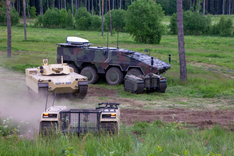Cybernetica is proud to announce its participation in three ambitious research and development initiatives funded by the European Defence Fund (EDF). The projects AI-WASP, iMUGS2, and GARUDA represent key advancements in autonomous systems, artificial intelligence, and cybersecurity for next-generation defence technologies. Each project involves a multinational consortium of leading industry and research organisations, strengthening European defence capabilities and technological sovereignty.
AI-WASP: advancing AI for swarm-enabled platforms
AI-WASP (Artificial Intelligence Warfare Adaptive Swarm Platform) focuses on developing AI technologies for swarming capabilities in collaborative autonomous platforms. The project aims to enhance decision-making autonomy, mission adaptability, and resilience in unmanned arial and ground systems. In consortium led by Finnish defence and technology company Patria, Cybernetica contributes its expertise in secure AI systems, supporting the integration of trustworthy and cybersecure AI into complex defence platforms, cybersecurity and cyber situational awareness in swarming.
iMUGS2: expanding the frontier of unmanned ground systems
Building on the success of the original iMUGS (Integrated Modular Unmanned Ground System) project, iMUGS2 further develops scalable, secure and interoperable unmanned ground vehicle (UGV) systems for European defence forces. Led by Milrem (multinational company initially started in Estonia), the project aims to establish a modular, open architecture that supports various payloads and mission profiles. Cybernetica’s role focuses on cybersecurity that ensures secure interoperability between autonomous ground systems and command units.
GARUDA: pioneering reconfigurable autonomous aerial systems
Led by ONERA (France), GARUDA (reconfiGurable Autonomous collaboRative UnmanneD Aircraft) is a 3-year initiative to develop the next generation of collaborative aerial platforms. The project introduces a disruptive design approach through iterative system development and simulation, enabling the creation of adaptable UAV variants built around a shared core architecture. Cybernetica leads the cybersecurity work package, developing a comprehensive security framework that encompasses threat modelling, secure architecture design, and a cybersecurity management system tailored for autonomous aerial operations.
Cybernetica’s Head of Cybersecurity R&D Marko Jõemets said that technologies developed in these projects are directly contributing to the future of defence technologies. “All military machinery relies on secure network operations to ensure sustainable control over every situation, as well as minimise risks of security breaches. We are proud to contribute to these important advancements of the defence industry with our decades-long information and cybersecurity expertise to ensure secure-by-design production of such mission-critical equipment,” he concluded.
